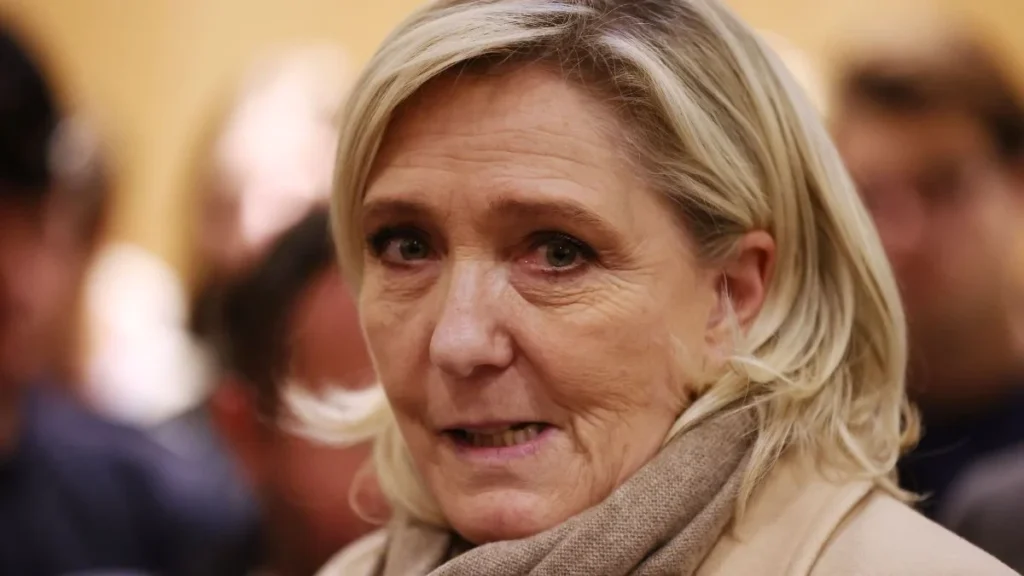Marine Le Pen, a dominant figure in French politics and leader of the far-right National Rally (RN), has been convicted of embezzling European Parliament funds. This ruling not only carries legal consequences but also shakes up the political landscape in France. With a four-year sentence—two of which are under electronic surveillance—and a five-year ban from public office, Le Pen’s political future hangs in the balance.
In this article, we’ll break down the charges against her, the court’s ruling, and what this means for the National Rally and the broader political scene in France. Could this mark the end of Le Pen’s political career, or will she find a way to make a comeback? Let’s dive in.

The Charges Against Marine Le Pen
Allegations of Embezzlement
Marine Le Pen and several other members of her party, the National Rally (RN), were accused of misusing funds from the European Parliament. The allegations suggest that between 2004 and 2016, Le Pen and her associates improperly allocated parliamentary funds meant for hiring assistants, instead diverting them for party-related activities. Investigators claim that these funds were used to pay party staffers who were not performing parliamentary work, essentially channeling EU money into the RN’s operations.
Amount Involved
The total sum of misappropriated funds is estimated to be €4.1 million, a substantial amount that was meant to support legitimate parliamentary work. According to court findings, Le Pen personally misused over €136,000, with the rest involving other members of the party. The scale of the embezzlement case led to a detailed legal investigation spanning several years, resulting in the charges brought against her.
Other Implicated Individuals
Le Pen was not the only politician caught in this scandal. Eight other former RN European lawmakers and at least 12 parliamentary aides were also implicated in the scheme. Among those named in the investigation were key figures in the party, some of whom had held significant leadership roles in European and national politics. These revelations have raised concerns about systemic financial misconduct within the National Rally and could impact the party’s credibility among voters.

The Court’s Ruling and Its Implications
Sentencing Details
After a lengthy legal battle, the French court found Marine Le Pen guilty of embezzling European Parliament funds. As a result, she was sentenced to four years in prison, with two years under electronic surveillance rather than behind bars. This type of sentencing means she may serve her time under strict house arrest with monitoring rather than in a traditional prison setting. Additionally, the court imposed a five-year ban from holding public office, effectively disqualifying her from running in the 2027 French presidential election—a significant blow to her political career.
Political Consequences
This ruling marks a major turning point in French politics. Marine Le Pen has long been a dominant force in the country’s far-right movement, having advanced to the second round in the last two presidential elections. With her now legally barred from running, the National Rally (RN) faces uncertainty in its leadership. The decision also casts doubt on the party’s ability to maintain its growing electoral influence, as Le Pen was seen as its most viable candidate for a future presidency.
Immediate Legal Reactions
Following the verdict, Le Pen and her legal team announced plans to appeal the ruling. She has denied all wrongdoing, calling the case politically motivated and an attempt to silence her and her party. However, even if she appeals, the ruling remains enforceable, meaning she cannot participate in elections unless the decision is overturned. Meanwhile, the National Rally will need to quickly reassess its leadership and election strategy, especially with European Parliament elections approaching in 2026.

How This Conviction Affects the National Rally
Leadership Crisis: Who Will Take Over?
Marine Le Pen has been the face of the National Rally (RN) for over a decade, leading the party through multiple elections and pushing its far-right ideology into the mainstream of French politics. With her five-year ban from holding public office, the party now faces a major leadership vacuum. Although Le Pen remains the party’s symbolic leader, her inability to run in the 2027 presidential election leaves the RN scrambling to find a strong replacement.
Potential Successors: Is Jordan Bardella the Future of RN?
One of the most likely figures to take over is Jordan Bardella, the current president of the National Rally. At just 28 years old, Bardella has already proven to be a skilled politician, successfully leading the party to strong performances in European and regional elections. However, while he is popular within the party, he lacks the nationwide recognition and experience that Le Pen has built over the years. Other figures within the RN, including long-time party members, may also step up to challenge Bardella’s leadership.
Public and Party Reactions: Divided Opinions
Le Pen’s conviction has sparked mixed reactions within the RN and among the French public. Her supporters see the ruling as a politically motivated attack, arguing that it was designed to eliminate one of President Emmanuel Macron’s strongest challengers. On the other hand, critics argue that the conviction is a necessary step toward holding politicians accountable and preventing the misuse of public funds.
Within the RN, party members are split between those who want to stand by Le Pen and those who believe it’s time for the party to move forward with new leadership. If the party fails to unite behind a strong successor, it could weaken its chances in future elections, particularly with the 2026 European Parliament elections and the 2027 presidential race on the horizon.

Broader Political and Legal Repercussions
Impact on France’s Far-Right Politics
Marine Le Pen’s conviction marks a significant turning point for the far-right movement in France. Over the years, she worked to rebrand the National Rally (RN) from its extremist roots into a more mainstream nationalist party, making it a serious contender in national elections. With her ban from public office, the French far-right is at a crossroads—will it continue Le Pen’s strategy of softening its image, or will a new leader push for a more radical approach?
Furthermore, her absence in the 2027 presidential election could shift far-right voters to other nationalist or conservative candidates, potentially benefiting figures like Éric Zemmour, who has positioned himself as an alternative to Le Pen’s brand of populism.
Legal Precedent and Political Accountability
Le Pen’s conviction also reinforces the importance of accountability in French and European politics. France has seen multiple political figures face legal trouble, including former Presidents Nicolas Sarkozy and Jacques Chirac, both of whom were convicted for financial misconduct. This ruling sends a message that no politician is above the law, even those with significant public support.
For the European Union, this case highlights ongoing concerns about financial fraud within EU institutions. The misuse of parliamentary funds is a serious issue, and Le Pen’s conviction could lead to stricter financial oversight and reforms to prevent future embezzlement cases involving European lawmakers.
Comparisons to Other Political Scandals
Le Pen’s conviction adds her name to a list of European politicians embroiled in financial scandals. Similar cases include:
- Silvio Berlusconi (Italy): The former Italian prime minister was convicted of tax fraud and banned from holding office for several years.
- Angela Merkel’s CDU Party (Germany): The party faced major corruption allegations in the early 2000s, though Merkel herself was not implicated.
- Nicolas Sarkozy (France): The former French president was found guilty of corruption and illegal campaign financing.
While some politicians have managed to recover politically after legal troubles, others have seen their careers permanently damaged. Whether Le Pen can make a comeback will depend on the success of her appeal and the response from her party and supporters.

What’s Next for Marine Le Pen and French Politics?
Possible Appeal Outcomes: Can She Overturn the Verdict?
Marine Le Pen has made it clear that she intends to appeal the court’s ruling, maintaining her innocence and condemning the decision as politically motivated. If her appeal is successful, the five-year ban on holding public office could be overturned, and she might regain eligibility for the 2027 presidential election. However, legal experts are divided on whether her appeal will be successful, given the weight of the evidence presented during the trial. Even if the appeal does not result in an acquittal, the lengthy process could delay the political fallout, allowing Le Pen to continue her leadership of the National Rally for a while longer.
Nevertheless, the appeal process itself is unlikely to alter the fact that the RN now faces a leadership crisis. If her conviction is upheld, it will be difficult for Le Pen to maintain the same level of influence within the party, especially with new leadership emerging.
The Future of the 2027 Presidential Elections
The 2027 presidential election is rapidly approaching, and Le Pen’s absence leaves a significant void within the National Rally. Jordan Bardella, the party’s current president and one of its most prominent figures, is already being seen as a potential successor to Le Pen in the presidential race. However, Bardella’s relatively limited national recognition compared to Le Pen’s longstanding prominence could pose a challenge for him in securing voter support.
Bardella is likely to emphasize the need for renewal within the party, presenting himself as a fresh face with a new direction. Whether voters embrace this change or long for Le Pen’s more established leadership will be key to determining the RN’s electoral success. In any case, the 2027 election will likely see new faces rise from both the far-right and the center-right, with Le Pen’s conviction shaking up the traditional political dynamics in France.
France’s Political Landscape Moving Forward
This scandal has shaken the French political establishment, particularly in the context of the 2026 European Parliament elections. As the RN struggles with leadership issues, other political parties—including Macron’s La République En Marche (LREM) and traditional conservative factions like Les Républicains—may seek to capitalize on the RN’s weakened position. With a rising sense of disillusionment among voters, especially in rural and working-class areas, it’s possible that new political alliances or independent candidates could emerge as serious contenders.
Le Pen’s conviction also calls into question the future of the far-right in Europe, where populist parties are gaining ground. While her legal troubles may slow the momentum of far-right politics in France, it could also push the RN to redefine its message—potentially causing splits or shifts in ideology within the party.
What Will Happen to the National Rally?
The National Rally is at a critical juncture. While some within the party will continue to rally behind Le Pen, others will view this as a chance to reshape the RN’s identity, either by pivoting toward a more moderate stance or doubling down on hardline nationalism. Strategic decisions within the party will likely play a central role in its future success. How the RN responds to this crisis—whether by finding a new leader or adjusting its platform—will ultimately decide its viability in the 2027 presidential race and beyond.
Conclusion
Marine Le Pen’s conviction is a pivotal moment for both her political career and the future of the National Rally. With a sentence that includes prison time under electronic surveillance and a ban from public office, Le Pen’s political future is now uncertain. As she prepares to appeal the verdict, the question remains: Can she bounce back, or is this the end of her era at the helm of the far-right movement in France?
The National Rally now faces a leadership vacuum, with Jordan Bardella emerging as a potential successor. However, the party must navigate a divided response from its supporters and the larger French electorate. The outcome of this legal battle could reshape the party’s future, influencing not only the 2027 presidential election but also France’s political dynamics in the coming years.
Whether Le Pen can reclaim her place in French politics or whether a new leader will rise to take her place, one thing is clear: this conviction is more than just a legal issue. It is a turning point for the far-right in France and could have lasting consequences for the broader European political landscape.
What are your thoughts on this political crisis? Will Le Pen’s appeal be successful, or will the National Rally struggle to maintain its influence in the years to come? Share your opinion in the comments below.
Table of Contents
Tonga Threatened by a Massive Tsunami – What You Need to Know – trendsfocus
Far-right leader Marine Le Pen is barred from seeking public office for embezzlement | AP News